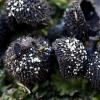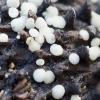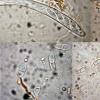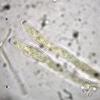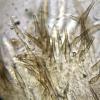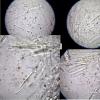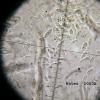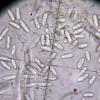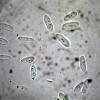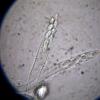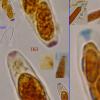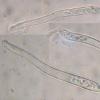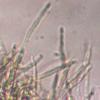
28-02-2026 14:43
A new refrence desired :Svanidze, T.V. (1984) Novy

29-11-2024 21:47
Yanick BOULANGERBonjourJ'avais un deuxième échantillon moins mat

27-02-2026 17:51
 Michel Hairaud
Michel Hairaud
Bonjour, Quelqu'un peut il me donner un conseil p

27-02-2026 16:17
 Mathias Hass
Mathias Hass
Hi, Found this on Betula, rather fresh fallen twi

27-02-2026 12:56
Åge OterhalsFound on fallen cones of Pinus sylvestris in midle

27-02-2026 11:21
 Yannick Mourgues
Yannick Mourgues
Hi to all. Here is a specie that can may be relat

26-02-2026 15:00
Me mandan el material seco de Galicia, recolectada
Calycina
Pablo Chacón,
22-02-2010 22:15
 Bonne nuit tout.
Bonne nuit tout.Initialement joint une image de ce dôme Ascomycètes trouvé Quercus coccifera.
Calycelina je pense
Toute idée de commencer l'étude-il?
Nicolas VAN VOOREN,
22-02-2010 22:38

Re:Calycina
Pablo,
il faudrait les mesures des spores et montrer la réaction des asques dans le Lugol (IKI).
il faudrait les mesures des spores et montrer la réaction des asques dans le Lugol (IKI).
Pablo Chacón,
22-02-2010 23:02

Re:Calycina
Nicolas,
J'ai de l'étudier en profondeur, mais en principe je vois réaction positive à l'iode.
J'apporte les données ne sont pas de données concluantes
Asques 80 microns
Spores 8-10 microns
J'ai de l'étudier en profondeur, mais en principe je vois réaction positive à l'iode.
J'apporte les données ne sont pas de données concluantes
Asques 80 microns
Spores 8-10 microns
Hans-Otto Baral,
22-02-2010 23:20

Re:Calycina
Could be a Calycina as well. I wpuld like to see the living paraphyses and their contents. Are the spores already 1-septate inside the living asci?
This group is quite difficult, so one needs more data, spore width is a minimum, also croziers, excipulum, hairs.
The brown "hairs" on your photo are phialides of a Chalara and this is the anamorph of the fungus. Many Calycina and Calycellina have such an anamorph.
Zotto
This group is quite difficult, so one needs more data, spore width is a minimum, also croziers, excipulum, hairs.
The brown "hairs" on your photo are phialides of a Chalara and this is the anamorph of the fungus. Many Calycina and Calycellina have such an anamorph.
Zotto
Pablo Chacón,
24-02-2010 19:40
Hans-Otto Baral,
24-02-2010 20:08

Re:Calycina
Hi Pablo
that helps, the VBs are very distinct. The spore photo is important, couold you please send it alone, in higher concentration? Do you have a scale for it?
that helps, the VBs are very distinct. The spore photo is important, couold you please send it alone, in higher concentration? Do you have a scale for it?
Pablo Chacón,
24-02-2010 20:34
Hans-Otto Baral,
24-02-2010 21:44

Re:Calycina
So the spores are about 7.5-11.5 x 3-3.7 µm from your scale. And they are 1-septate inside the living asci, yes, this is clear from the small drops which are close to the septa and which are visible in the asci.
With my key I arrive around Calycina parilis, but that species has narrower spores and long-stalked apothecia.
With my key I arrive around Calycina parilis, but that species has narrower spores and long-stalked apothecia.
Pablo Chacón,
24-02-2010 21:58

Re:Calycina
I would be grateful if you give me documents of the genus.
Thank you very much Zotto
Thank you very much Zotto
Hans-Otto Baral,
24-02-2010 22:20

Re:Calycina
oh that's difficult. Have you looked on the DVD? the Helotiales-key did not much change since then, and there are a lot of images about Calycina (in dir. Hyaloscyphaceae).
tell me if you find don't them.
Others have used the name Pezizella instead of Calycina.
zotto
tell me if you find don't them.
Others have used the name Pezizella instead of Calycina.
zotto
Hans-Otto Baral,
07-03-2010 23:33

Re:Calycina
Raul just sent me nice images of this collection which he studied in fresh state. I am mainly amazed of the hemiamyloid, rather large apical ring which I arranged and paste here.
The spores are actually 1-septate inside the living asci, and the paraphyses have nice refractive vacuoles (VBs). Chalara is abundant.
No idea what this is. At least a Calycina seems sure.
Zotto
The spores are actually 1-septate inside the living asci, and the paraphyses have nice refractive vacuoles (VBs). Chalara is abundant.
No idea what this is. At least a Calycina seems sure.
Zotto
Richard Korf,
08-03-2010 18:33
Re:Calycina
I agree with Zotto, there is no doubt but that this is a Calycina. The anamorph is a clincher, present in many but not all species. I believe it is a very large genus, including many species originally described as Helotium or even Peziza, and a genus in desperate need of a monograph.
Dick
Dick
Javier Ormad,
23-03-2011 20:37
Re:Calycina
Presento de nuevo esta posible Calycina (o por lo menos macroscópicamente lo parece), en cúpulas de fruto de Quercus coccifera. Aparece el anamorfo Chalara. Las medidas esporas son más largas. Aporto datos.
Creo que pueda ser el mismo especimen que ha presentado Pablo.
Again this may present calycina (or at least what appears macroscopically) in domes fruit of Quercus coccifera. Chalara anamorph appears. The spores are longer measures. Contribute data.
I think it may be the same specimen that presented Pablo
Creo que pueda ser el mismo especimen que ha presentado Pablo.
Again this may present calycina (or at least what appears macroscopically) in domes fruit of Quercus coccifera. Chalara anamorph appears. The spores are longer measures. Contribute data.
I think it may be the same specimen that presented Pablo
Javier Ormad,
23-03-2011 20:40
Re:Calycina
Ascomas sésiles, disciformes, incluso pulvinados, gregarios o aislados de hasta 2 mm de diámetro. Himenio blanquecino, formando una película pilosa blanca sobre toda la estructura del apotecio, visible tan solo a gran aumento. Superficie externa de las mismas características.
Ascas cilíndrico-claviformes, octosporadas, biseriadas o acumuladas en zona superior, sin clara amiloidad, de hasta 100 x 8 micras. Ascosporas largamente elípticas irregulares, lisas, hialinas, con 2 gútulas de mayor tamaño acompañadas de otras más pequeñas, con septo central en las maduras, de 9.5-16(17) x 2.5-3 micras. Parafisis filiformes, septadas, con múltiples VBs. uniformes en grosor. Excípulo ectal de estructura angular. Pelos hialinos, sin septos, no son rectilíneos, acabados con puntas normalmente romas
Ascomata sessile, disciform, even pulvinate, gregarious or isolated for up to 2 mm in diameter. Hymenium white, forming a white hairy on the whole structure of the apothecium, visible only at high magnification. Outer surface of the same characteristics.
Asci cylindrical-clavate, octosporadas, biseriate or accumulated on top, without clear amylose up to 100 x 8 microns. Ascospores long irregular elliptical, smooth, hyaline, with 2 larger guttae accompanied by other smaller central septum in mature, 9.5-16 (17) x 2.5-3 microns. Paraphyses filiform, septate, with multiple VBs. uniform thickness. Ectal Excípulo angular structure. Hairs hyaline, without septa, are not straight, usually blunt-tipped finishes
Ascas cilíndrico-claviformes, octosporadas, biseriadas o acumuladas en zona superior, sin clara amiloidad, de hasta 100 x 8 micras. Ascosporas largamente elípticas irregulares, lisas, hialinas, con 2 gútulas de mayor tamaño acompañadas de otras más pequeñas, con septo central en las maduras, de 9.5-16(17) x 2.5-3 micras. Parafisis filiformes, septadas, con múltiples VBs. uniformes en grosor. Excípulo ectal de estructura angular. Pelos hialinos, sin septos, no son rectilíneos, acabados con puntas normalmente romas
Ascomata sessile, disciform, even pulvinate, gregarious or isolated for up to 2 mm in diameter. Hymenium white, forming a white hairy on the whole structure of the apothecium, visible only at high magnification. Outer surface of the same characteristics.
Asci cylindrical-clavate, octosporadas, biseriate or accumulated on top, without clear amylose up to 100 x 8 microns. Ascospores long irregular elliptical, smooth, hyaline, with 2 larger guttae accompanied by other smaller central septum in mature, 9.5-16 (17) x 2.5-3 microns. Paraphyses filiform, septate, with multiple VBs. uniform thickness. Ectal Excípulo angular structure. Hairs hyaline, without septa, are not straight, usually blunt-tipped finishes
Javier Ormad,
23-03-2011 20:47
Hans-Otto Baral,
23-03-2011 21:46

Re:Calycina
Your macro looks lilke a hairy hymenium? Looks strange. The multiguttulate paraphyses do not fit in Calycina, but also not in Arachnopeziza. Do you say that the asci are inamyloid? Did you use Lugol?
Maybe a section would clarify the hairs?
Zotto
Maybe a section would clarify the hairs?
Zotto
Javier Ormad,
24-03-2011 18:46
Javier Ormad,
24-03-2011 18:50
Hans-Otto Baral,
24-03-2011 19:21

Re:Calycina
Sorry, the images are too unsharp. The asci might be IKI-blue, but I am not sure.
The hairs cover the hymenium, do they?
Zotto
The hairs cover the hymenium, do they?
Zotto
Javier Ormad,
24-03-2011 21:39
Hans-Otto Baral,
24-03-2011 22:22

Re:Calycina
yes, this looks blue. And the asci might well fit into Calycina.
Zotto
Zotto
